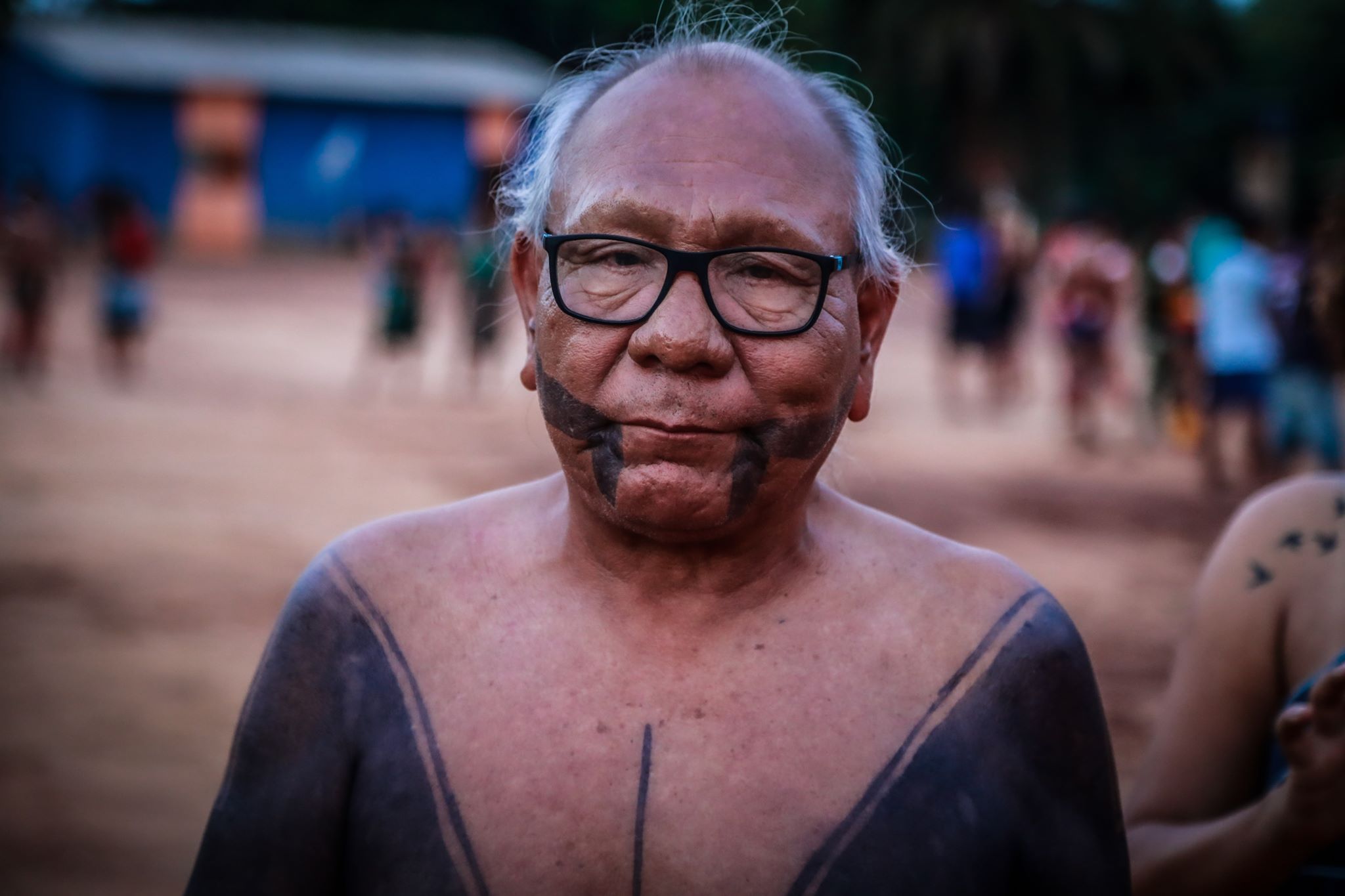
Kayapó Leader Dies of COVID-19 in Brazil
This article was co-published with NACLA.
CURITIBA—After a 10-day battle with COVID-19, Kayapó leader Paulinho Paiakan died on Wednesday, June 17 at Araguaia Regional Hospital in Pará, Brazil.
Bep’kororoti Payakan, better known as Paulinho Paiakan, was an influential leader and an important voice in Brazil’s Indigenous movement. Paiakan had no official birth certificate but was about 68 years old at his time of passing.
He was a member of the Mebengokre people, better known as Kayapó, who live in the Xingu river basin in the Brazilian states of Mato Grosso and Pará. Famous for their leading role in the Indigenous movement, the Kayapó only had their first contact with the Brazilian government in the 1950s.
Paiakan became internationally famous for his activism for Indigenous rights and environmental protection. Throughout the 1980s and 1990s, Paiakan fought for the inclusion of Indigenous rights in Brazil’s Federal Constitution, protested the Belo Monte (Kararaô) hydroelectric dam, and campaigned for the demarcation of Indigenous lands.
As a teenager, he became one of the first Kayapó to speak Portuguese fluently. His grasp of the language and knowledge of the world outside the village solidified his role as a communicator and mediator between Indigenous groups and whites. FUNAI (Brazil’s National Indigenous Foundation) hired Paiakan in 1972 to assist the federal government in communicating with the Amazon’s Indigenous communities and facilitate public works in the area.
“I grew up and wanted to see the world,” he said in a January interview during the Meeting of the Mebengokre Peoples and Brazilian Indigenous Leaders. “I wanted to leave the tribe to learn and have the means to help my people.”
Paiakan ventured out into the world and became a powerful voice for saving the Amazon.
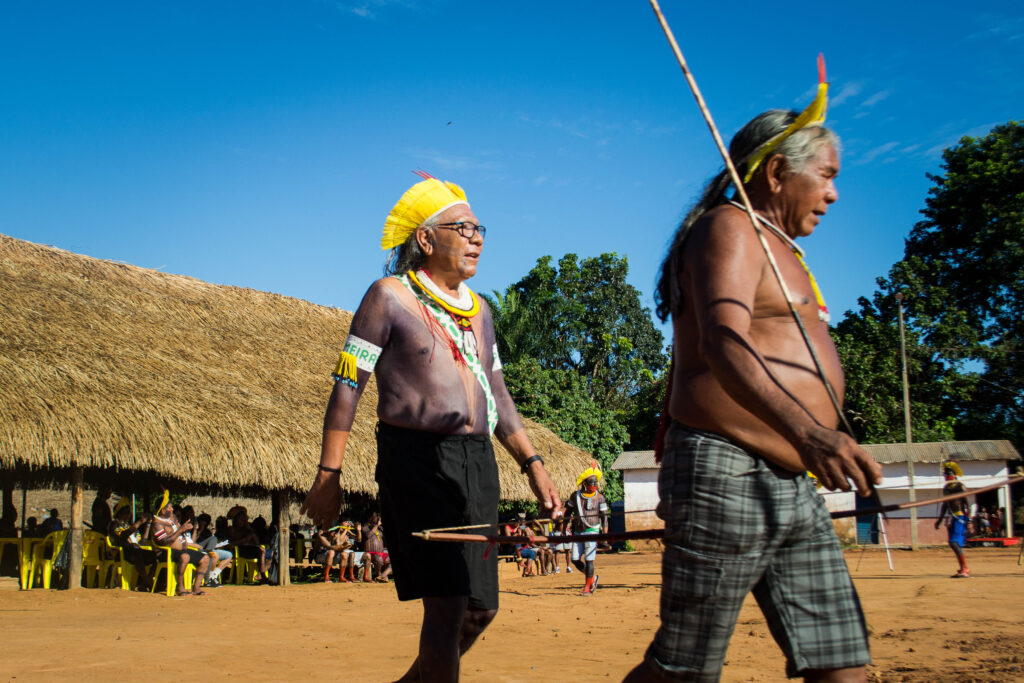
Paulinho Paiakan (left) during the Meeting of the Mebengokre Peoples and Brazilian Indigenous Leader in January 2020 (Photo: Rafael Forsetto).
Worldwide recognition
Paiakan made his name in national politics during Brazil’s transition to democracy in the 1980s. In 1987, a Constituent Assembly began drafting the country’s new Magna Carta. The Indigenous movement seized the opportunity. Leaders such as Paulinho Paiakan, Raoni Metuktire, and Ailton Krenak mobilized Indigenous peoples to demand the inclusion of Indigenous rights in the new Constitution. Their efforts drew international attention and resulted in the inclusion of their rights in the Brazilian Constitution of 1988.
Indigenous groups, international activists and even celebrities supported Paiakan. In 1989, public attention turned to Altamira in the Brazilian state of Pará, where Paiakan organized the First Meeting of the Indigenous Peoples of the Xingu. The meeting served to oppose the construction of the Belo Monte Hydroelectric Dam, which threatened Indigenous lands and the environment.
The intense plea once again drew international attention. The World Bank, one of the project’s main investors, withdrew its support for the dam’s construction due to Indigenous protests and international backing from famous activists including Sting.
Always innovative, Paiakan collaborated with The Body Shop, an organic cosmetics company based in the United Kingdom. He introduced sustainable production of Brazil-nut oil in the Kayapó villages. He believed that these projects helped reduce deforestation in the region.
Charismatic and globally renowned, Paiakan became a central figure in environmental protection. He frequently traveled abroad and received prizes such as the United Nations’ Global 500 Leadership Award.
Fall from grace
In 1992, Brazil prepared to host the United Nations’ Conference on Environment and Development, better known as Rio 92. Paulinho Paiakan was at the height of his popularity and was one of the most awaited speakers at the event.
However, just a few weeks before the conference, Paiakan and his wife Irekran were accused of attacking and raping Silvia Leticia Ferreira da Luz, an 18-year-old student from Pará. The rumors surrounding the crime were shocking, alleging cannibalism in additional to sexual assault. Veja, one of Brazil’s most popular magazines, made the infamous case their cover story, featuring a photo of Paiakan under the headline “The Savage.”
The controversy split public opinion. Some condemned Paiakan while others defended his innocence, declaring that private interests wanted to silence the Indigenous leader. As Brazil’s media outlets slammed Paiakan, newspapers such as the Los Angeles Times questioned the accusations and cited the possible involvement of political enemies behind the case.
Ultimately, the couple was not prosecuted for rape due to lack of evidence. In a second hearing, Paiakan was found guilty of indecent assault, which was still being disputed in Brazil’s Supreme Court at the time of his death. To this day, debates continue over the Indigenous leader’s innocence in the crime. The controversial case irreparably stained Paiakan’s reputation and turned him into a recluse. He returned to his village with his family and moved away from the spotlight.
CAUTIOUS return
Two decades after the accusations, Paiakan returned to activism. In 2012, he spoke at Rio +20, the United Nations Conference on Sustainable Development. Most recently, he was a leading speaker in the Meeting of the Mebengokre Peoples and Brazilian Indigenous Leaders this January.
In an interview in January, he told me how deeply the hostilities of Brazil’s current government worried him. Paiakan lived in the city for many years and sought integration with the “white man.” Through his experiences, he has become wary over the years and affirms that Indigenous people should be careful with those who want to become too close.
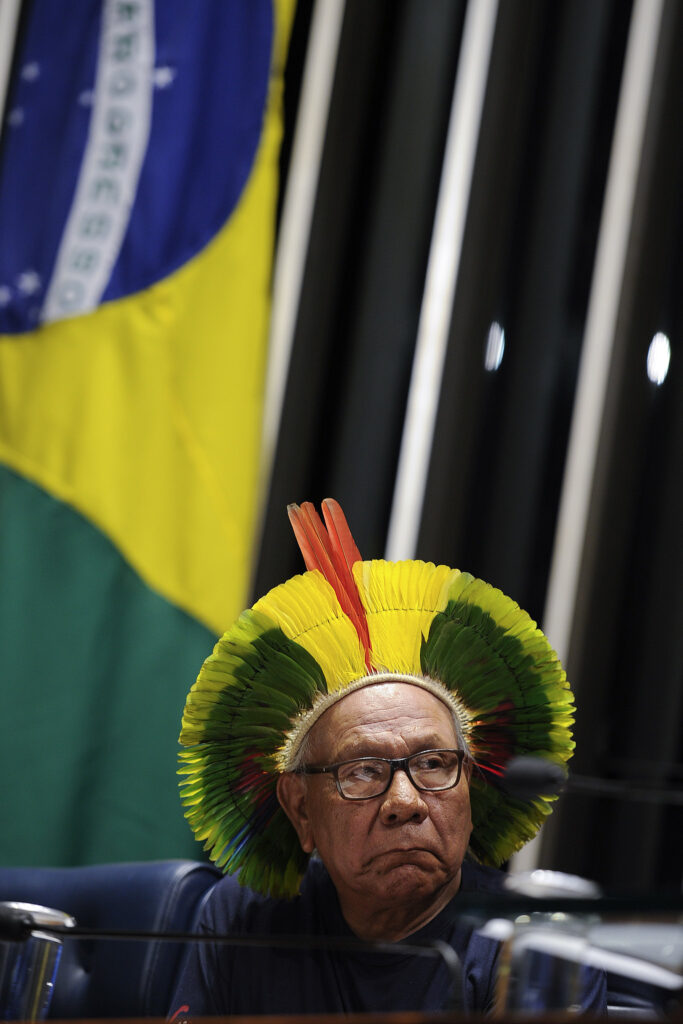
Paulinho Paiakan during a Senate hearing in 2018. (Edilson Rodrigues, Agência Senado/Flickr).
“There are Indigenous relatives who speak well, like white men. They’re the ones that are being dangerous to our people. They want to be friends with the current government and hand their people over to them,” Paiakan said. “The government wants to repeat what happened in 1500,” referring to the year the Portuguese arrived to what is now Brazil, and the devastation that followed for the Indigenous population.
Over the years, President Jair Bolsonaro has been a staunch critic of policies regarding Indigenous peoples in Brazil, famously stating that there’s “a lot of land for few Indians.” Indigenous groups’ rights have faltered under Bolsonaro. The increased deforestation during his government impacts them directly.
“What this government is doing is destroying the world,” Paiakan said. “[They are] causing contamination, pollution, forest fires, smoke, deforestation and destruction. These are threats against the world.”
Paiakan’s death is a great loss for Brazil’s Indigenous communities, which are being devastated by COVID-19. He is the latest victim of the virus that has killed over 300 Indigenous Brazilians since March. Indigenous communities are especially vulnerable when it comes to COVID-19 and have a higher mortality rate than the national average. Some of the most affected tribes, such as the Yanomami and Kokama, are located in the state of Amazonas, which faces one of the country’s worst Coronavirus outbreaks.
Brazil currently has the world’s second highest COVID-19 death toll. As Jair Bolsonaro suffers international scrutiny for his weak response, the controversies pile up. The country’s Ministry of Health has been accused of withholding data on suspected cases and deaths.
In response, Brazil Indigenous People’s Articulation (APIB) has set up the National Committee for Indigenous Life and Memory, dedicated to accurate reporting on coronavirus cases amongst Indigenous peoples. Thus far, the committee has confirmed over 7,000 cases among Indigenous peoples in Brazil–a number that keeps growing.
Paulinho Paiakan’s life has been scrutinized throughout the years and debates over his legacy are sure to continue. Regardless, his impact is undeniable. Paiakan helped Indigenous peoples win their legal rights in Brazil and gain international recognition. As a hostile government and environmental degradation threaten the gains of Brazil’s Indigenous movements, another guardian of the forest has been lost.
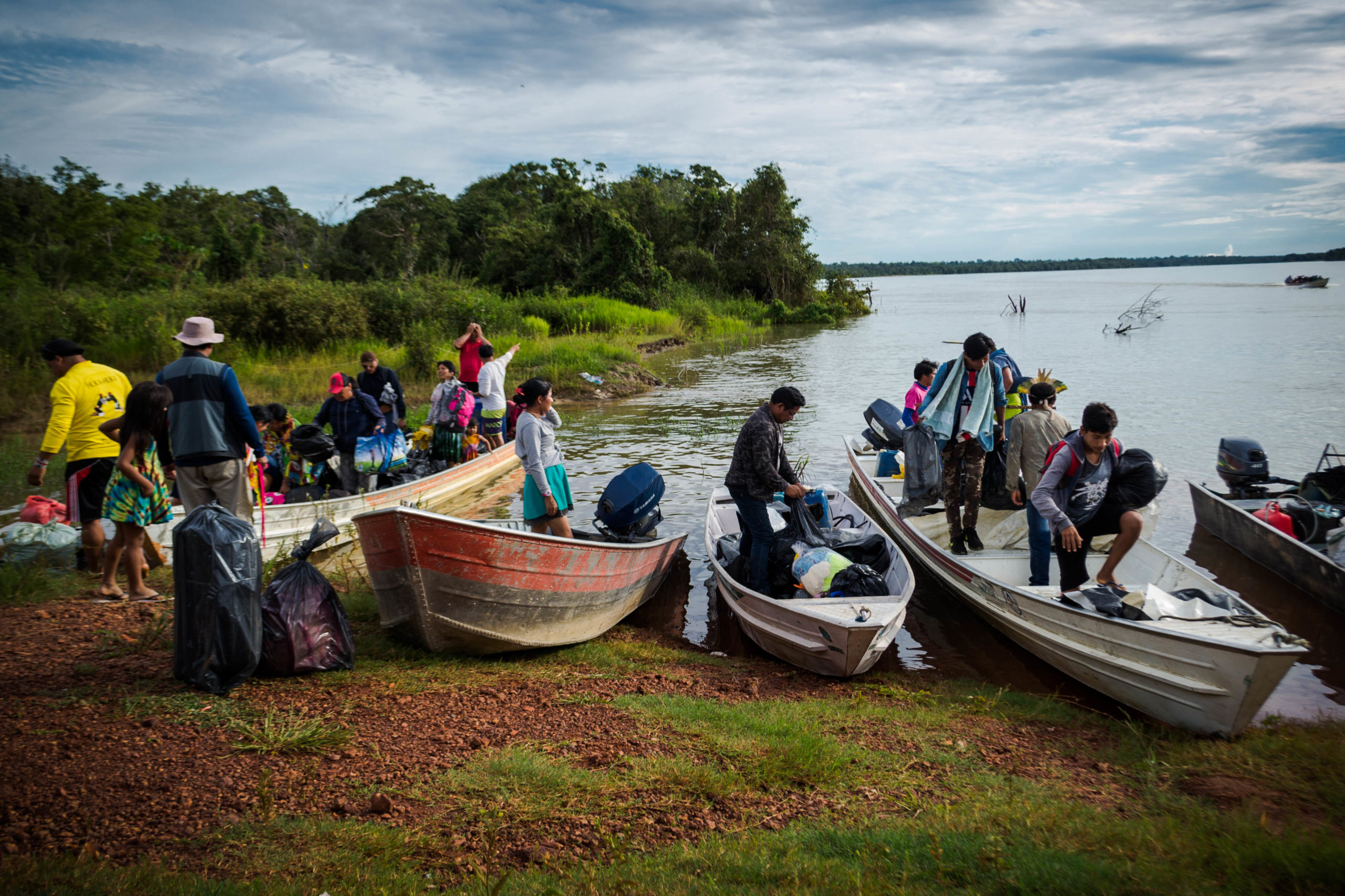
Chief Raoni, Nobel Peace Prize Nominee, Presides Over Historic Meeting with Over 600 Indigenous Leaders in Brazil
This article originally appeared on Mongabay and is also available in Portuguese. LAND is republishing it under Creative Commons.
The harsh midday sun shines down in the Kayapó village of Piaraçu in the state of Mato Grosso, Brazil. Dozens of indigenous men and women sit under the cover of the House of Men, a large structure made of wood and hay that is located in the middle of the village. They are here for the Meeting of the Mebengokre Peoples and Brazilian Indigenous Leaders, a historic gathering of Brazil’s indigenous peoples to discuss the critical situation they currently face in their country. As speakers and audience members discuss and debate urgent issues, Raoni Metuktire listens attentively to the pleas and woes of those present.
The 89-year-old Kayapó leader, often referred to simply as Chief Raoni, called the meeting to help articulate a response to the Brazilian government’s incendiary rhetoric and aggressive actions against the country’s native peoples. It comes as the result of one of the most devastating years for the Amazon in recent memory. Along with the highest deforestation rates in 11 years, the violent murders of at least seven indigenous leaders contributed to the increasing hostility against the country’s indigenous peoples. President Jair Bolsonaro’s intentions of opening up indigenous lands for agribusiness and mineral extraction further intensify the already dire situation that they face.
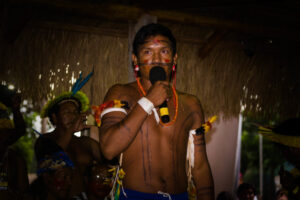
Kawali Koli, a young Enawenê-Nawê community member, speaking in a debate. (Photo by Rafael Forsetto.)
From Jan. 14-17, more than 600 indigenous leaders from 47 different tribes met at the village, making it one of the biggest meetings to ever occur on Brazilian indigenous territory. Presided over by Chief Raoni himself, the meeting likened itself to official state negotiations, allowing time for traditional leaders, women and youths to voice their opinions. Throughout the meeting, Raoni made it clear that the indigenous peoples do not want to attack anyone, but rather to defend themselves. Speaking through translator Megaron Txucarramãe, the Kayapó leader said: “We’re not meeting here to plan for a war or conflict. We are here to defend our people, our cause, and our land … I would never call a meeting to attack someone. We are here to defend ourselves.”
Olympio Serra, a Brazilian indigenist, anthropologist and former director of Xingu Indigenous Park, stressed the historic nature of the event. “It was the opportunity that these different peoples had to answer Raoni’s call and sit down to better understand and organize an urgent plan of action against [the government’s] colonialist mentality,” he said.
The landmark debates lasted for four days and, after extensive review, resulted in the Piaraçu Manifesto, a four-page document denouncing the Brazilian government for its role in putting indigenous peoples at risk. The manifesto not only demands respect from President Bolsonaro and the government, but also clearly states that environmentally disastrous projects have no place on indigenous lands or anywhere else. “We do not accept gold digging, mining, agribusiness and leasing of our lands, we do not accept loggers, illegal fishermen, hydroelectric plants and other projects, such as the Ferrogrão, that will impact us in a direct and irreversible way,” the document says.
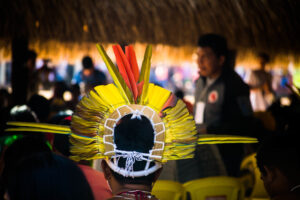
Photo by Rafael Forsetto.
Brazil’s indigenous population is no stranger to megaprojects that sacrifice the environment in the name of development and profit. The BR-080 highway cuts through the indigenous territory where the meeting occurred and separates Piaraçu from its neighboring village, Pakaya. Huge trucks carrying grain cross the territory throughout the day, a visual representation of how agribusiness directly affects their way of life. During a speech at the event, Taphi Yawalapiti reiterated the importance of preserving the Amazon: “If the forest disappears, our cultures will also disappear … our languages will disappear. We need to fight for the preservation of our land; we need to unite our forces.”
Many representatives called for unity among the indigenous peoples during this difficult moment. Respect, however, was the main recurring demand during the event. “We want, above all else, respect for our lives, our traditions, our customs and the Federal Constitution which protects our rights,” the manifesto reads. Raoni and other leaders will present the final document to the National Congress in Brasília at a date not yet announced. The Raoni Institute has confirmed that the manifesto will also be available in English, Spanish and French.
Nobel Peace Prize
Raoni himself is no stranger to the spotlight. The chief is internationally famous for his efforts to protect the Amazon and guarantee indigenous rights. Perhaps his most notable struggle is the campaign he spearheaded against the Belo Monte hydroelectric dam (formerly known as Kararaô), in the northern state of Pará. The protests spanned from the 1970s to the 2010s, but the dam was ultimately built in 2011, under the presidency of Dilma Rousseff. Nonetheless, it solidified Chief Raoni’s standing as a global figure and leading environmental activist.
Thanks to his conservation efforts, Chief Raoni’s face and emblematic lip-plate were a common sight on newspapers and television throughout the 1980s and 1990s. His boost in popularity during this time was due to highly publicized events such as the Meeting of the Indigenous Peoples of the Xingu, which received worldwide coverage thanks to the participation of British musician Sting. Since then, Raoni has lived a more reserved lifestyle away from the cameras. Recent events, however, prompted him to return to the global stage and continue his fight for indigenous rights and for the Amazon.
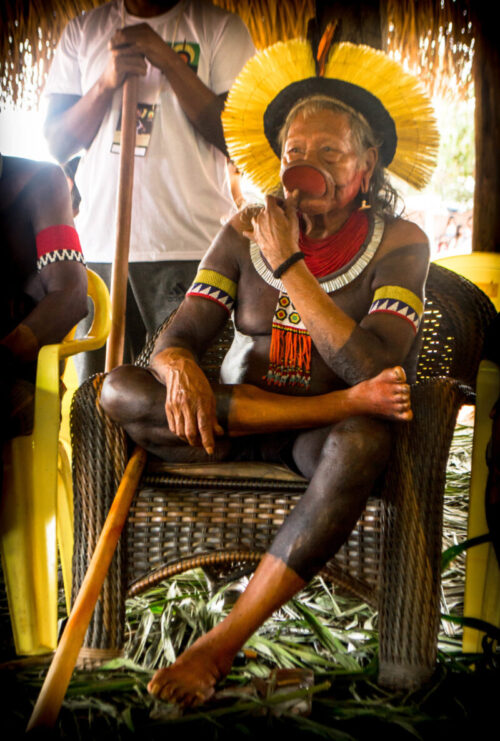
Chief Raoni presiding over debates in Piaraçu. (Photo by Rafael Forsetto.)
In 2019, he met with French President Emmanuel Macron, followed by a meeting with Pope Francis at the Vatican. This return to form did not sit well with Bolsonaro, who mentioned Raoni by name during his speech at the opening of the 74th United Nations General Assembly. In his statements, the Brazilian president said: “The vision of one indigenous leader does not represent that of all Brazilian indigenous peoples … Mr. Raoni’s monopoly is over.” Bolsonaro also used the opportunity to exalt an outspoken supporter of the government named Ysany Kalapalo as an alternative spokesperson for the indigenous cause.
The speech sparked impassioned responses all over the world, and shortly thereafter Chief Raoni’s name popped up as a contender for this year’s Nobel Peace Prize. The symbolic value of Brazil’s first laureate being an indigenous person is not lost upon his supporters. The Darcy Ribeiro Foundation is leading a campaign to rally support for the Nobel Prize.
As part of the campaign, Raoni has a full schedule ahead of him for 2020. Later this month, he will be speaking at Oxford University on environmental protection and human rights. He will also be meeting abroad with key figures to help rally support for the environmental and indigenous cause in Brazil. “The best way to do battle is through dialogue. I have been fighting ever since they started to build this road [BR-080],” Raoni says. “I don’t fight with my hands; I fight with my thoughts.”